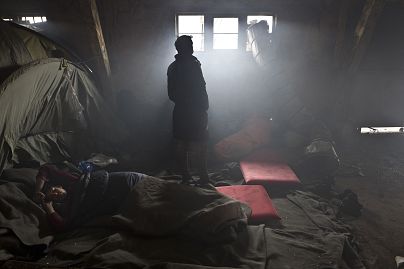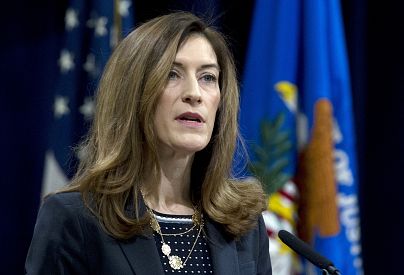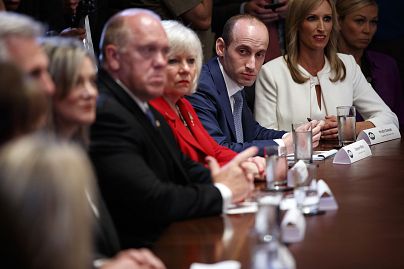Hardliners issued their own report that several ex-officials say misstates evidence and inflates the threat posed by people born outside the U.S.
The Trump administration has consistently sought to exaggerate the potential security threat posed by refugees and dismissed an intelligence assessment last year that showed refugees did not present a significant threat to the US, three former senior officials told NBC News.
Hardliners in the administration then issued their own report this year that several former officials and rights groups say misstates the evidence and inflates the threat posed by people born outside the US.
At a meeting in September 2017 with senior officials discussing refugee admissions, a representative from the National Counterterrorism Center came ready to present a report that analysed the possible risks presented by refugees entering the country.
But before he could discuss the report, Associate Attorney General Rachel Brand dismissed the report, saying her boss, Attorney General Jeff Sessions, would not be guided by its findings.
"We read that. The Attorney General doesn't agree with the conclusions of that report," she said, according to two officials familiar with the meeting, including one who was in the room at the time.
Brand's blunt veto of the intelligence assessment shocked career civil servants at the interagency meeting, which seemed to expose a bid to supplant facts and expertise with an ideological agenda. Her response also amounted to a rejection of her own department's view, as the FBI, part of the Justice Department, had contributed to the assessment.
"She just dismissed them," said the former official who attended the meeting.
The intelligence assessment was "inappropriately discredited as a result of that exchange," said the ex-official. The episode made clear that "you weren't able to have an honest conversation about the risk."
A current DHS official defended the administration's response to the intelligence assessment, saying immigration policy in the Trump administration does not rely solely on "historical data about terrorism trends," but rather "is an all-of-the-above approach that looks at every single pathway that we think it is possible for an immigrant to come into the United States."
A spokeswoman for DHS said, "If we only look at what terrorists have done in the past, we will never be able to prevent future attacks…We cannot let dangerous individuals slip through the cracks and exploit our refugee program, which is why we have implemented security enhancements that would prevent such violent individuals from reaching our shores, while still upholding our humanitarian ideals."
The Justice Department did not respond to a request for comment in time for publication.
Following the dismissal of the assessment, anti-immigration hardliners in the administration clashed with civil servants about how to portray the possible threat from refugees in documents drafted for inter-agency discussions, former officials said. In the end, the president's decision last year to lower the ceiling for refugee admissions to 45,000 did not refer to security threats, but cited staffing shortages at DHS as the rationale. But once the decision was issued, the White House released a public statement that suggested the president's decision was driven mainly by security concerns and said "some refugees" admitted into the country had posed a threat to public safety.
"President Donald J. Trump is taking the responsible approach to promote the safety of the American people," said the Sept. 29 statement.
Political appointees in the Trump administration then wrote a new report a few months later that seemed to contradict the view of the country's spy agencies.
The January 2018 report by the Departments of Justice and Homeland Securitystated that "three out of every four, or 402, individuals convicted of international terrorism-related charges in US federal courts between September 11, 2001, and December 31, 2016 were foreign-born."
In a press release at the time, DHS Secretary Kirstjen Nielsen said the report showed the need for tougher screening of travelers entering the country and served as "a clear reminder of why we cannot continue to rely on immigration policy based on pre-9/11 thinking that leaves us woefully vulnerable to foreign-born terrorists."
But the report is being challenged in court by several former officials and rights groups who say it inflates the threat posed by people born outside the US Two lawsuits filed in Massachusetts and California allege the report improperly excludes incidents committed by domestic terrorists, like white supremacists, and wrongfully includes a significant number of naturalised US citizens and foreigners who committed crimes overseas and were brought to the United States for the purpose of standing trial.
Mary McCord, former assistant attorney general of the Justice Department's National Security Division, which prosecutes terrorism charges, said the January 2018 report is "unfortunately both over-inclusive and under-inclusive."
"The result is a report that presents an inaccurate picture of the threat of terrorism in the United States," McCord said.
When the report was released in January 2018, Trump tweeted that it showed the need to move away from "random chain migration and lottery system, to one that is merit based" because it showed that "the nearly 3 in 4 individuals convicted of terrorism-related charges are foreign-born."
But the report only focuses on international terrorism, which is defined as a crime committed on behalf of a foreign terrorist organisation. The document excludes domestic terrorism committed by groups such as white supremacists or anti-government militias, which are more likely to be supported by those born in the US.
Because of the way the terrorism statute is written, those who support domestic organisations like anti-government or white supremacists groups cannot be charged with terrorism, even if the groups they support have committed crimes. Only supporters of foreign terrorist organisations designated by the State Department can be charged with "material support" of terrorism.
Still, Trump has repeatedly stated that the overwhelming majority of terrorists in the United States came from overseas, even before the 2018 report.
In his first speech to Congress in February 2017, Trump said that the "vast majority of individuals convicted of terrorism and terrorism-related offenses since 9/11 came here from outside of our own country."
Benjamin Wittes, a senior fellow at the Brookings Institution, MSNBC legal analyst and editor-in-chief of the Lawfare blog, took issue with that statement and sued the Justice Department to provide documents that backed up the president's claim. But the Department was unable to locate any records.
"There are a lot of domestic terrorism cases, and they are generally not committed by people born abroad. To the extent that those cases were excluded — white supremacist violence, anti-abortion terrorism and militia violence — the inquiry is grossly biased," Wittes wrote on Lawfare.
Wittes said that almost 100, or about a quarter, of the 402 individuals listed as foreign-born terrorists committed their crimes overseas and were brought to the US to face trial.
During her time in government as the chief of the Refugee Affairs Division at US Citizenship and Immigration Services, Barbara Strack said her staff worked diligently to thoroughly vet refugees for any possible terrorist links. But she said there was no information she came across that indicated refugees posed a significant security threat.
"I did not see evidence that refugees presented an elevated national security risk compared to other categories of travelers to the United States," she told NBC News.
The administration must decide by the end of the month how many refugees to allow in the country in the next fiscal year. Trump's senior adviser, Stephen Miller, known for his hawkish stance on immigration, has been pushing for a drastic reduction in the ceiling.
The cap was set at 45,000 last year, but the number of refugees allowed in the country has fallen far below that ceiling, with only about 20,000 resettled in the United States since October 2017. Rights advocates and former officials accuse the White House of intentionally slowing down the bureaucratic process to keep the numbers down, overloading the FBI and other government agencies with duplicative procedures.














